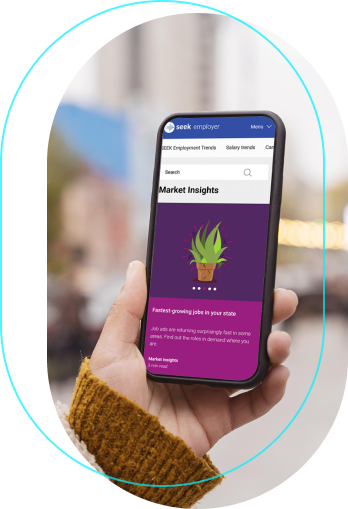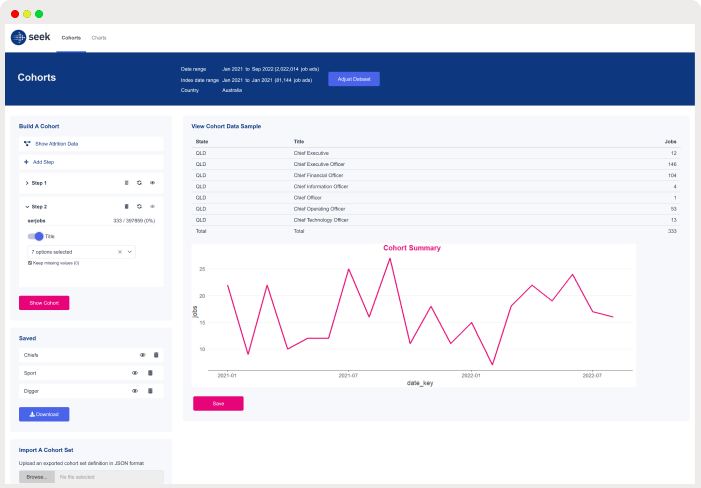Services provided
- Discovery
- UX/UI Design
- Web App Development
- Reporting & Data Visualisation
Key stats
- Custom Development using R
- 5500+ bespoke lines of code
- 70+ bespoke files
- 19 data models
- 61 chart types
Engagement length
5 months
Client Background
Launched in 1998, SEEK is a market leader in online employment marketplaces, operating internationally with a large presence in the Asia Pacific region and Latin America. SEEK employs more than 3,000 people across the globe, and has exposure to 900 million jobseekers.
SEEK operates a range of subsidiaries, including SEEK Learning and SEEK Volunteer, and has stakes in other popular online employment marketplaces.
In addition to their investment in upcoming technologies, including artificial intelligence, SEEK operates a Growth Fund that invests in early stage businesses in the online education, HR SaaS and contingent labour industries.

Problem Overview
The Market Data & Customer Analytics (MDCA) team at SEEK are responsible for producing labour market insights and reports for external use by a variety of organisations, including hiring companies and government departments. These reports consist primarily of SEEK’s first-party data, and are usually distributed as PowerPoint presentations or PDF decks.
Producing these reports with insights at any level of granularity below standard dimensions (such as a role title, or group of role titles) was a ‘high touch’ bespoke exercise undertaken by a data analyst at SEEK. The process of generating a report could take up to six weeks, depending on the amount of data or complexity of reporting required.
Data analysts needed to manually extract data from databases using complex SQL queries, format and manipulate the outputs into usable structures in Microsoft Excel, and then generate charts using a collection of manually coded R visuals.
Although the outputs were high quality, the reach was limited due to the long production time and skilled expertise required to compile a report.
SEEK contracted Codex to develop a solution to streamline their processes and empower the MDCA team to produce high quality reports faster and more efficiently.
Phase 1: Discovery
Nicknamed ‘Project Hercules’, after the versatile and reliable Lockheed C-130 Hercules aircraft, the team at Codex began the engagement with a series of Discovery workshops.
Initial kick-off meetings with key stakeholders from the MDCA team allowed Codex to establish the functional and non-functional project requirements, with SEEK clearly articulating their must-haves. The overarching requirements for Hercules were that:
The MDCA team at SEEK were familiar with Tableau, Power BI, Google Data Studio, and the programming language, ‘R’. With this in mind, Codex conducted a thorough investigation into available solutions, both custom and off-the-shelf.




The comparison involved evaluating each platform against the detailed functional and non-functional requirements, and scoring them accordingly. Aspects that were investigated included:
- The preferred data model the systems operated in.
- How scalable, efficient and easily maintainable they were.
- The ability to further customise the platform through custom development.
- Whether there was API support.
- What environment it ran in, and whether the solution was easily shared.
- The ability to have a nicely designed, custom user experience and interface.
- The time required to develop, implement and train the SEEK team.
Phase 2 & 3: Design & Development
This deeper dive involved building a lightweight version of the Tableau reports (with a custom PowerPoint export and format script) and a lightweight R Shiny interface. Regular weekly stand-ups and fortnightly showcases allowed SEEK to provide timely feedback to Codex, which meant that both demonstrated solutions effectively met the needs of the MDCA team. The source files and custom code were delivered to SEEK to review, and the decision was made that the available customisation, flexibility, and functionality offered by the R Shiny web application was the most suitable for their needs.
With approval to proceed with the development of the R Shiny application, the Digital Experience team at Codex were brought into the project to design a custom user interface that functional, easy to use, and on-brand. Close collaboration between the Design and Data teams at Codex and the MDCA team at SEEK meant that the final production-ready solution was successfully delivered in 3 months.
The responsive web application now empowers Data Analysts at SEEK to:
With each report now completed within a matter of hours, not weeks.
Exciting discussions about the next iteration of Project Hercules have already begun, with the opportunity to open the web app up to the rest of the business for custom reports next on the list.

19
Data Models
61
Chart Templates
120+
Charts per Report

Significant time & cost savings
Reports generated in minutes, not weeks
On-brand reports
Consistent designs direct into PowerPoint.
Future-proofed platform
Using a codebase that the MDCA team can develop on.
Improved team capacity & employee experience
The Key Takeaways When Building a Custom Web-based Reporting Platform
Project Hercules was delivered in 5 months with minimal issues or delays. Here are our three key takeaways from this project:
Deeper mini-discoveries at the beginning pay dividends
More often than not, teams jump straight to ‘solution mode’, implementing quick fixes based on current needs, without factoring in long-term business requirements. This frequently leads to systems that require significant amounts of ongoing maintenance, ultimately increasing costs and decreasing effectiveness.
Although SEEK had a preference for an existing skill set with R Shiny, they diligently engaged Codex for an unbiased external opinion, before deciding on a solution architecture. The results of our Discovery revealed two key platforms that could address the MDCA team’s needs now and in the future. SEEK’s decision to extend and engage in two ‘mini discoveries’ for both Tableau and R Shiny allowed them to see the powerful potential both solutions had to offer, and make an informed decision, minimising their risk.
Problems often appear larger prior to unpacking them in Discovery
Data problems can sometimes appear insurmountable upfront, especially when it’s an ongoing concern that impacts your daily work. Engaging a third party, like Codex, to conduct a comprehensive Discovery enables a fresh set of eyes to break down the problems into smaller, more manageable pieces without any bias. This also empowers organisations, like SEEK, to prioritise their needs and make decisions accordingly.
Reliable collaboration ensures a seamless transition from Discovery to Design and Development
One of the key drivers in Project Hercules success is what we like to call, ‘Reliable Collaboration’. As illustrated in the case study above, we don’t take a client’s brief, walk away, and come back with a solution after a few weeks. On Project Hercules, SEEK were actively engaged throughout the entire Discovery process, courtesy of regular stand-ups and end-of-sprint showcases, which allowed us to clearly define the requirements and functionality that led to the detailed investigation, recommendation and implementation of their R Shiny application.



